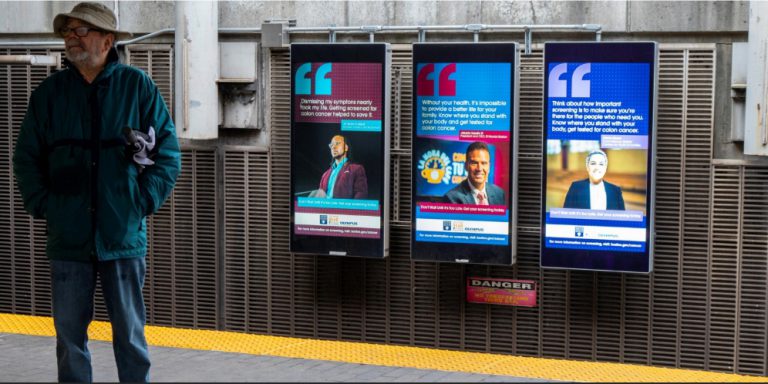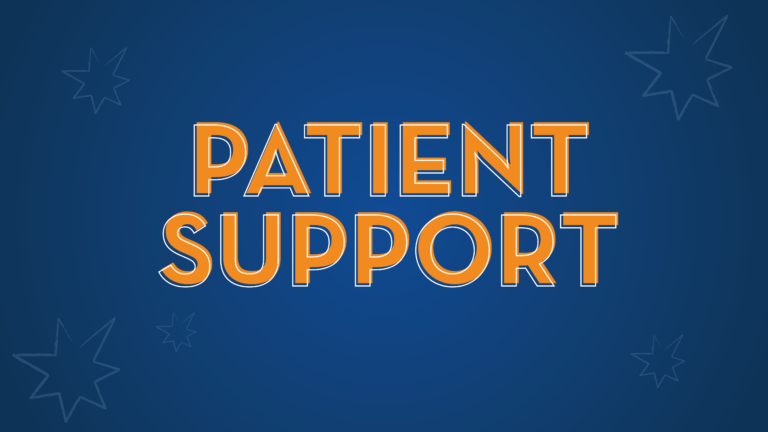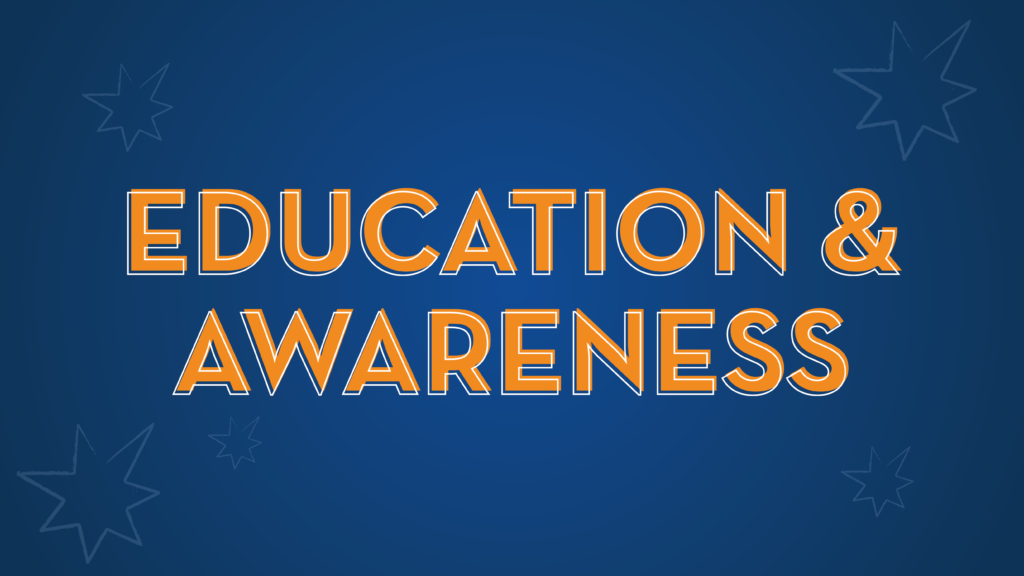
The rate of colorectal cancer diagnosis continues to rise. By 2030, colorectal cancer will be the number one cancer killer for adults under 50 years old. In order to effectively prepare communities for this increase, we seek to raise awareness and provide education to everyone.
To achieve this, we provide free and easily accessible informational materials and community-led education. We want all people to understand the signs and symptoms of colorectal cancer, and instill them with the understanding that early diagnosis is treatable, and that screening can save lives.
We believe entering communities with compassion, respect, humor, and understanding is the best place to start from when talking about a sensitive subject like bowel movements and colorectal cancer. By speaking with community leaders and organizations, we’re able to address the root issues in communities, and provide educational materials that directly help patients recognize the signs and symptoms of colorectal cancer.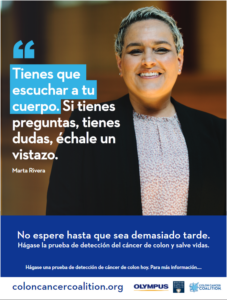
We work with organizations such as the Boston Public Health Commission to tailor colon cancer screening messaging to Black and Latino, Spanish-speaking, and Haitian Creole-speaking communities in the City of Boston.
“Our work with the Colon Cancer Coalition engages recognizable community champions, inviting all Bostonians to get screened for colon cancer and learn about the healthcare options available to them here in Boston,” says Mark Kennedy, Senior Program Manager in the Chronic Disease Prevention and Control Division at the Boston Public Health Commission.
“By showcasing community leaders in familiar local venues, and through bi-lingual informational videos, PSAs and print materials in the communication channels most widely used in each of these communities, we’re looking to earn the trust of those residents and encourage them to lean into learning and taking action on a topic that may be difficult, embarrassing, or emotionally taxing.”
Our educational campaign extends to roadside billboards and educational PSA campaigns. In order to effectively raise awareness, we seek to be where communities will see us most. Our campaigns in Green Bay, WI, Kansas City, MO, and Houston, TK were viewed by thousands of commuters each day.
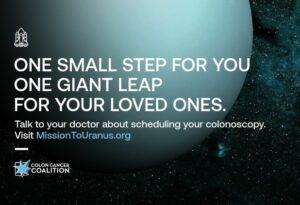 In addition to billboards, we use public service announcements and other creative campaigns to raise awareness while using humor. In 2022, we launched the Mission To Uranus, a space-exploration themed awareness campaign that was streamed on airwaves throughout March, during NFL commercial breaks in airports across the country in November, and highlighted on Twitter and other social media channels. This campaign was brought to life by BeautifulBeast Agency, whose Chief Creative Officer, Flor Leibaschoff lost her own brother to colorectal cancer and was a driving force behind the vision. Leibashoff spoke on the impact of the campaign, “the #MissionToUranus campaign is a powerful way to highlight the importance of colonoscopies, using levity as our wingman.”
In addition to billboards, we use public service announcements and other creative campaigns to raise awareness while using humor. In 2022, we launched the Mission To Uranus, a space-exploration themed awareness campaign that was streamed on airwaves throughout March, during NFL commercial breaks in airports across the country in November, and highlighted on Twitter and other social media channels. This campaign was brought to life by BeautifulBeast Agency, whose Chief Creative Officer, Flor Leibaschoff lost her own brother to colorectal cancer and was a driving force behind the vision. Leibashoff spoke on the impact of the campaign, “the #MissionToUranus campaign is a powerful way to highlight the importance of colonoscopies, using levity as our wingman.”
“When it comes to increasing colorectal cancer screening rates, and bringing education to the masses, we want to take a creative and unexpected approach,” says Chris Evans, president of the Colon Cancer Coalition. “Mission to Uranus helped us accomplish those goals.”
We also bring giant inflatable colons to nearly 40 events throughout the year. Used since 2016, these interactive educational tools allow participants and event-goers an inside look at their colon, and what doctors are on the lookout for when you receive a colonoscopy. Because these inflatable colons have been so impactful at our events, we have donated inflatable colons across the country, including communities in Nassau, Bahamas, Charlotte, NC, Houston, TX, and Kansas City, MO.
Emily Darville, the Local Event Director for Get Your Rear in Gear – Bahamas, told us about the impact of the inflatable colon on her community.
“I was introduced to the inflatable colon by my late sister Andrea Darville, who sadly passed away from colorectal cancer weeks before she was able to see it in person at the inaugural Get Your Rear in Gear – Bahamas. She was fascinated by it, and was so excited to have one present as she knew having it as a visual aid would draw people to the event.” Emily continues, “the inflatable colon has been a game changer in our community. Having it present at our local events with a gastroenterologist on site explaining what a healthy colon should look like in comparison to a colon affected by illness really makes a big difference. More and more people become intrigued and want to know more about the signs of colorectal cancer, testing, and ways to prevent it.”
excited to have one present as she knew having it as a visual aid would draw people to the event.” Emily continues, “the inflatable colon has been a game changer in our community. Having it present at our local events with a gastroenterologist on site explaining what a healthy colon should look like in comparison to a colon affected by illness really makes a big difference. More and more people become intrigued and want to know more about the signs of colorectal cancer, testing, and ways to prevent it.”
Education and awareness is important to the fight against colorectal cancer. By providing communities with culturally conscious materials, translated materials, and physical tools that visualize a healthy colon, we empower communities to think about their health, and give them the ability to advocate for themselves at the doctors office.

